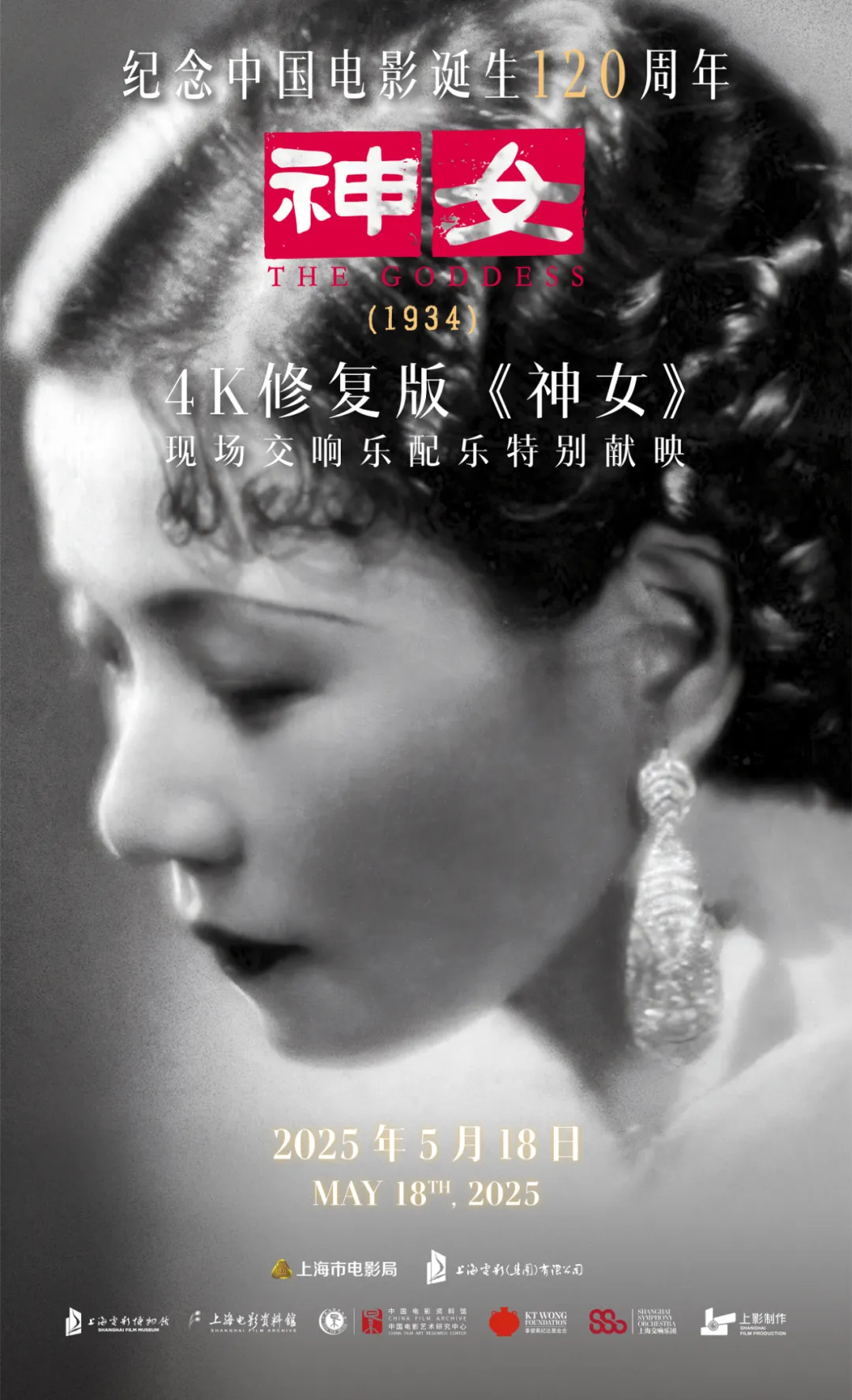
Shot in 1934, The Goddess is the pinnacle of the silent film era in China and an immortal classic of Chinese realist films. In the era when silent films were popular, films could not rely on sound to assist narrative, and the actors' body language, expressions, and camera language became the key to conveying emotions and stories. The Goddess is a model in this regard, and it occupies an unshakable position in the history of Chinese films with its unique artistic value.
After more than 90 years, this film is about to be presented to the audience in a brand new "way of opening" as a special commemoration of the 120th anniversary of the birth of Chinese film and the 90th anniversary of the death of the famous actress Ruan Lingyu.
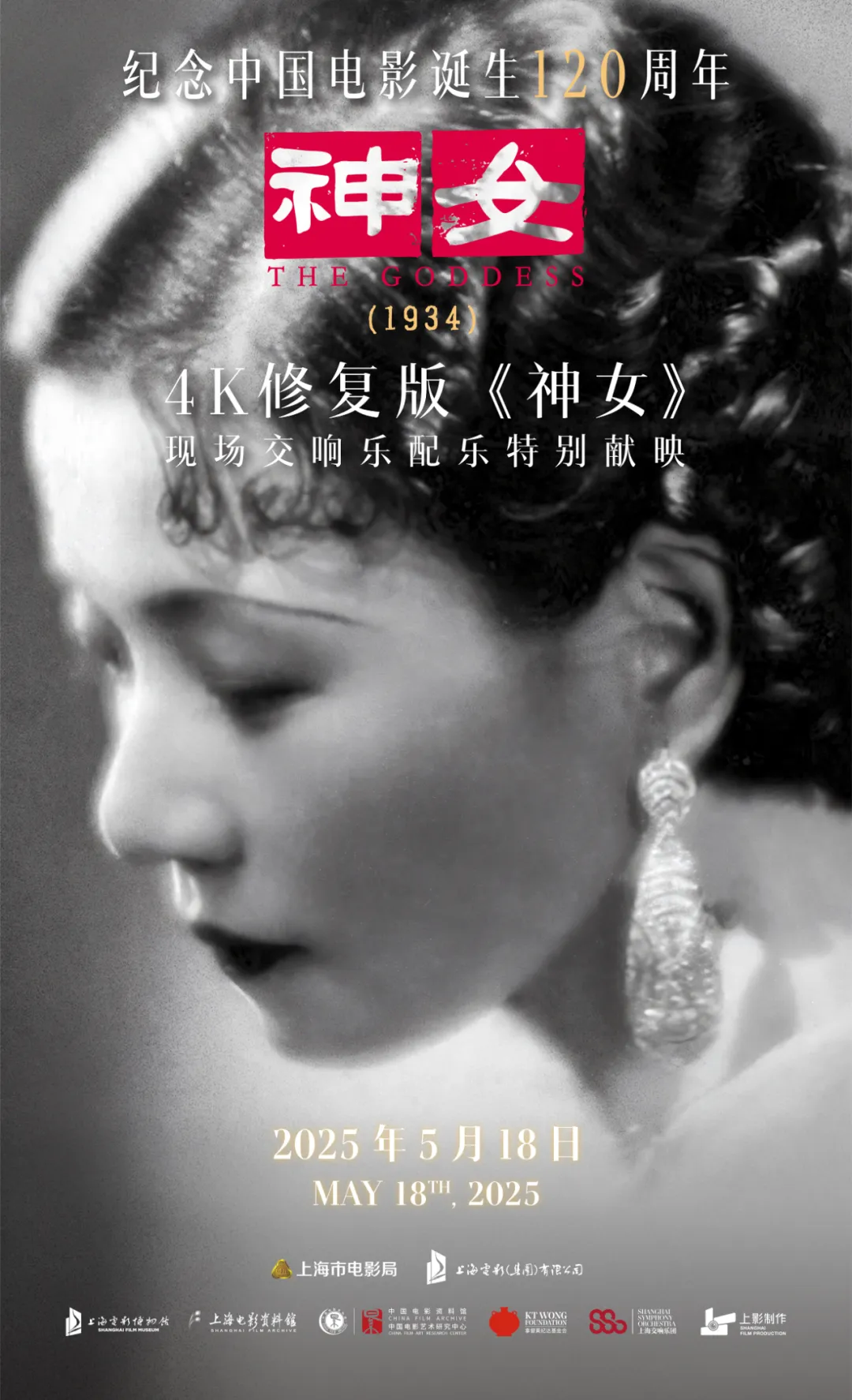
From May 18 to 23, the "Fragrant Shadows: See Them on and Off the Screen" will be held at Shanghai Cinema SHO, presenting a series of classic films with women as the protagonists or directed by women in different historical periods. Among them, the 4K restored version of "Goddess" will be the opening film, and on the opening day, it will be accompanied by the Shanghai Symphony Orchestra for live music, recreating the artistic charm of the silent film era through the innovative form of blending folk music with Western symphony.
The highest screening standards present the pinnacle of newly restored silent films
The story of "Goddess" focuses on a woman from the bottom of the society in old Shanghai. In order to raise her children and make a living, she struggled in the dark society and was forced to work in a profession that was not tolerated by the secular world. However, under this seemingly depraved appearance, she has an extremely pure and tenacious heart. Despite all kinds of hardships in life, harassment from hooligans and oppression from landlords, she never gave up hope for life and love for her children. She tried her best to protect her children and used her meager strength to fight against the injustice and darkness of society.
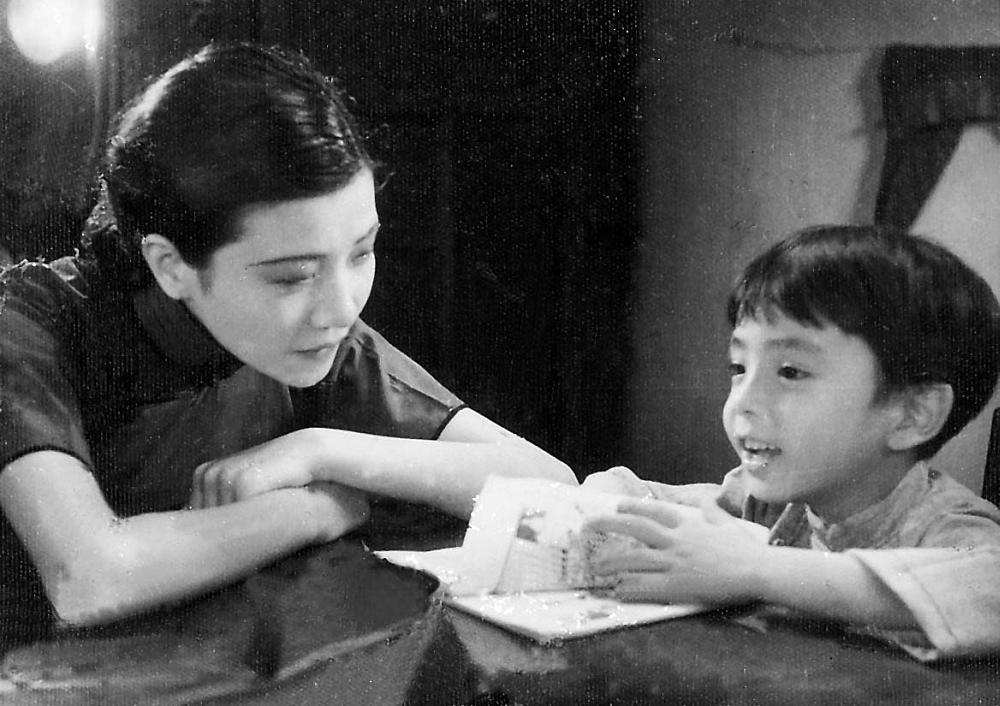
Stills from "Goddess"
Director Wu Yonggang, with his keen social insight and outstanding artistic expression, uses expressionist lens language to show the social conditions of old Shanghai, the images of orphans and widows, and echoes the situation of China at that time, which was devastated by the great powers and was in a state of collective trauma.
The legendary Ruan Lingyu portrayed the image of this mother and "goddess" vividly through her delicate and subtle performance, allowing the audience to deeply feel the tragic fate and indomitable spirit of the lower-class women of that era.
The Shanghai premiere of the 4K restored version of "Goddess" was carefully crafted in terms of audio-visual presentation. Relying on advanced AI technology and a professional restoration team, the China Film Archive conducted 4K ultra-high-definition scanning and restoration of the 35mm nitrate film of that year, following the principle of "restoring the old as it was", which not only restored the original texture of the film, but also gave it a detailed visual effect. The highest-standard screening conditions of the Dolby Theater will present the detailed beauty of the century, in the form of movie + symphony, allowing the beautiful "face" and pleasant "sound" to interweave in the 1,000-person hall of the Dolby Theater in Shanghai Cinema.
In addition to Goddess, the film festival also carefully selected 5 classic films produced by Shanghai Film Group, namely Basketball No. 5, Li Shuangshuang, Stage Sisters (4K), The Sound of the Fountain, and Human Ghost Love. These films are all directed by women or have women as the protagonists, focusing on the growth and fate of individual women from different angles, and showing the image of women from all walks of life and all industries.
As the first sports-themed film in New China, "Women's Basketball No. 5" tells the story of the struggle of women basketball players and shows the pursuit and struggle of women in the new era in sports career.
"Li Shuangshuang" focuses on the image of rural women, and through Li Shuangshuang's straightforward and daring character, it reflects the social changes in the countryside at that time;
"Stage Sisters" (4K) uses the life experiences of Yue Opera sisters as a clue to show the changes in the old Shanghai opera world and the perseverance and struggle of women in it;
"The Sound of the Spring" takes a kindergarten teacher as the protagonist, portraying a female image full of love and responsibility;
"Human, Ghost, Love" breaks through tradition and explores the dilemmas and choices of women in their artistic pursuits and real life from a unique perspective.
Women from different eras communicate with today's audiences on the big screen, jointly sketching out a colorful picture of the image of women in the history of Chinese cinema.
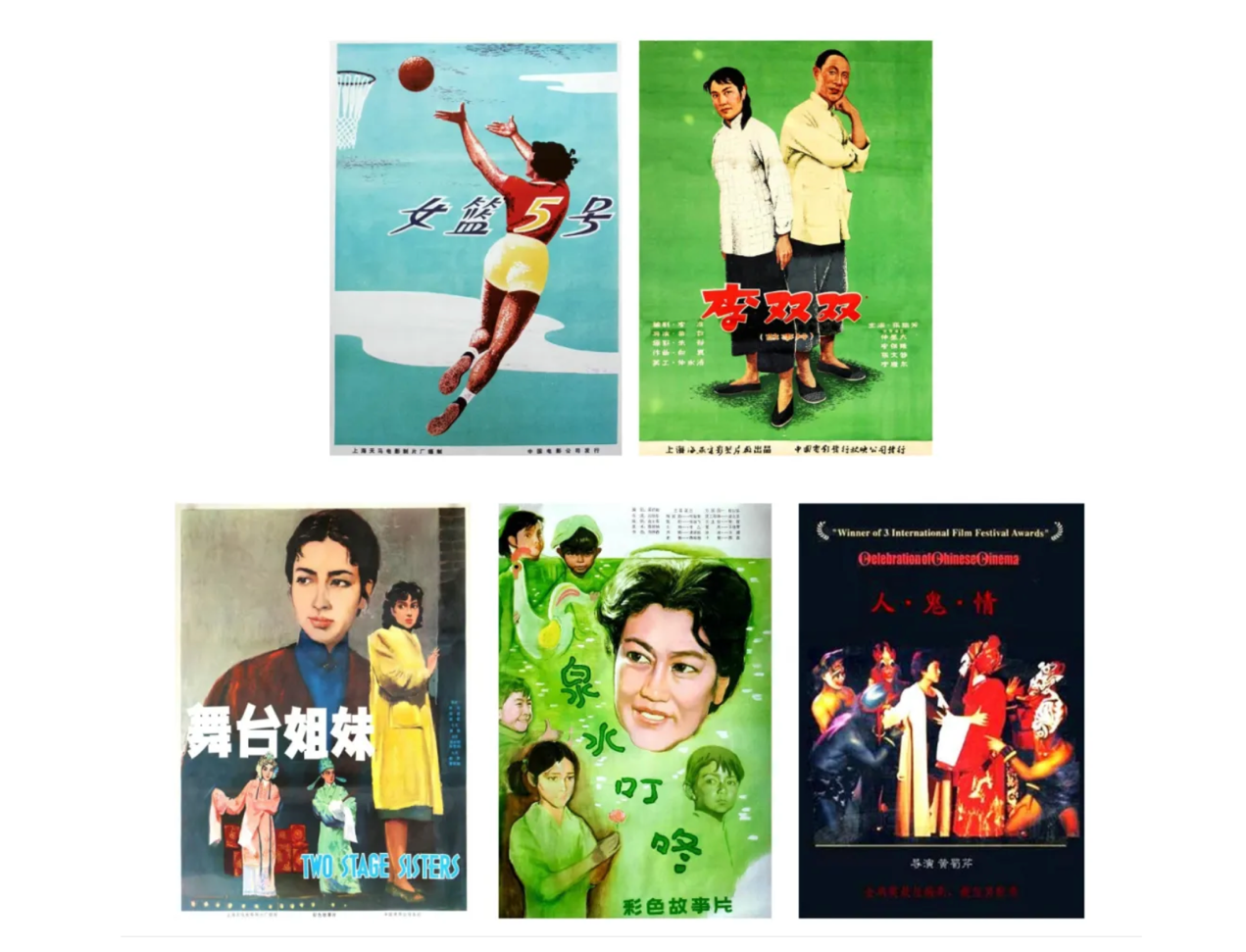
"Fragrant Figures: See Them on and Off the Screen" Film Festival List
The century-old Shanghai Jiaotong University takes the audience back to the era when movie music was popular
How special is this premiere? The Toronto International Film Festival screened it with piano music, the Portugal screening used a string quartet, and the French Archives screening invited the French Pelléas Chamber Orchestra to provide live music... When "Goddess" returns to Shanghai, the Shanghai Symphony Orchestra will play a new movement unique to this city for it.
It is understood that the Shanghai premiere will use the soundtrack specially created by composer Zou Ye for "Goddess". Zou Ye combines folk music elements with Western symphony, and the mournful sound of the erhu and the magnificent string music are intertwined, which not only echoes the urban temperament of Shanghai in the 1930s, but also strengthens the heavy feeling of "Goddess" as a bloody history.
Conductor Zhang Jiemin will lead the three-pipe Shanghai Symphony Orchestra and soprano singer Uriege to lead the audience back to the premiere of "The Goddess" in 1934.
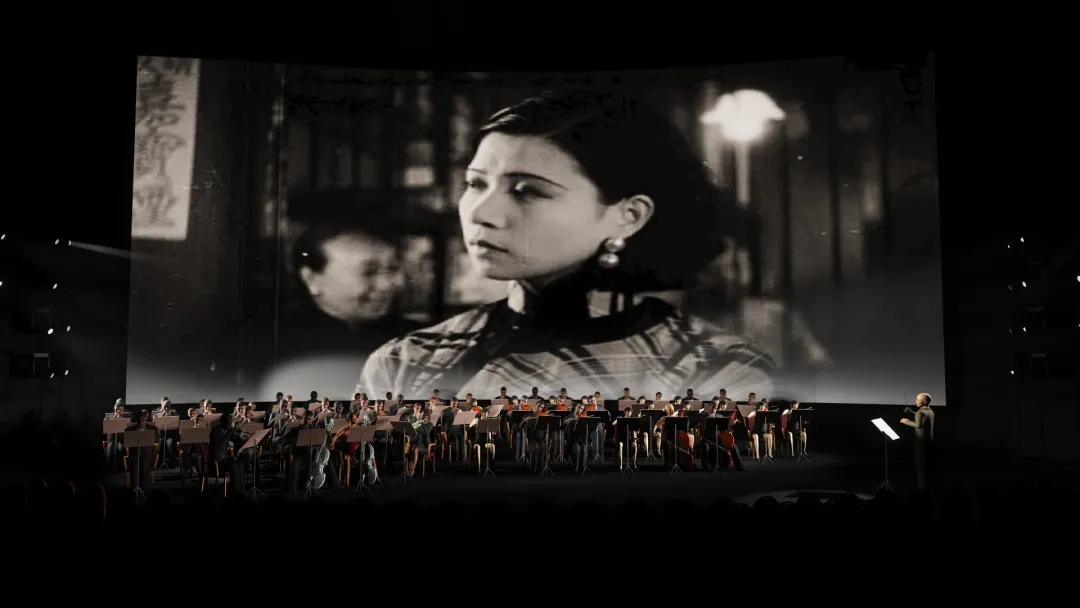
On-site renderings
"Both film and symphony originated in the West and were introduced to China through Shanghai. Both arts were very popular in Shanghai at that time." Zhou Ping, director of the Shanghai Symphony Orchestra, introduced that film music was popular in Shanghai in the early 20th century, and the Shanghai Symphony Orchestra, which has a history of 146 years, has a long history with film music. "At that time, Shanghai only had the Municipal Council Band (the predecessor of the Shanghai Symphony Orchestra), and many film music was performed live by the Municipal Council Band. The Shanghai Symphony Orchestra still retains many photos and posters of the performances conducted by Mei Baiqi."
Since the new century, Shanghai Jiaotong University has had many successful experiences in film, such as Ang Lee's Crouching Tiger, Hidden Dragon. This movie, which came out in 2000, made oriental martial arts world-renowned, and the film music composed by Tan Dun won the Oscar for Best Original Score, and the film soundtrack was recorded by Shanghai Jiaotong University.
Nowadays, film concerts are also the most popular performance type at the SJTU Summer Music Festival every year. Along the way, the Summer Music Festival has held many film concerts, such as the Chinese animated films "Havoc in Heaven" and "Magic Book", as well as Western classics "Titanic", "Amadeus", "A Space Odyssey", "The Matrix", and even Charlie Chaplin's black-and-white silent film "Modern Times".
Some movie concerts were performed at the Shanghai Symphony Hall, while others were staged outdoors on the green lawns of Huangpu District, such as "Titanic". "Thousands of audiences enjoyed the moon above their heads, fanned themselves with palm-leaf fans, and felt the breeze as if they were enjoying the cool air when they were children."
Zhou Ping said that movie concerts are different from ordinary symphony concerts. "The performance in a symphony concert is relatively free, and the conductor can adjust according to the atmosphere and mood of the scene. In a movie concert, the conductor has to have a metronome in his ears, and the music must be precisely matched to the movie images, without any gaps." For "Goddess", the difficulty of the performance is not in the performance itself, but in the coordination of music and movie images.
When "Goddess" is screened, the performers of the Shanghai Symphony Orchestra will wear traditional Shanghainese costumes, echoing the cheongsam worn by Ruan Lingyu on the screen.
"We are still in the fitting stage. The master has to measure the size of each performer and try them one by one, which takes a lot of time." Zhou Ping said with a smile that at the beginning the director suggested that the performers wear cheongsams, "but cheongsams are difficult for some people, such as cellists. Later, they changed to Shanghai style. Therefore, we also have to open the blind box to see what the clothes will look like in the end."
The film festival is guided by the Shanghai Municipal Film Bureau, hosted by the Shanghai Film Group, and undertaken by the Shanghai Film Museum and the Shanghai Film Archive. The participation of the Shanghai Symphony Orchestra further enriches the Shanghai Film Festival, presenting the deeper heritage and more diverse charm of the "City of Film".


